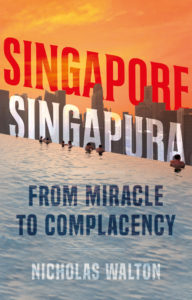The circus is most certainly coming to Singapore. While Kim Jong-un and Donald Trump impersonators pose next to the Merlion, correspondents tell their viewers that Sentosa used to be known as the Island of ‘death from behind.’ Meanwhile the former basketball star Dennis Rodman swings by, offering support and trying to gain publicity for a marijuana-based crypto-currency. Ahead of the summit between the North Korean and US leaders, Singapore is certainly relishing its role as the diplomatic go-to destination of our times. But while it is the natural third-party destination for such a show-down, Singapore’s own diplomatic balancing act warrants some attention of its own, as an indicator of a new Asian world of dilemmas and hard choices.
It is difficult to imagine a more suitable destination than Singapore for the face-off between Trump and the leader he nicknamed ‘Rocket Man’. Other potential venues nearer to Pyongyang are easily dismissed. There is no way the Americans would have agreed to hold such a meeting in Beijing or Vladivostok. Seoul was a non-starter, and Tokyo carries too many historical implications. Taipei would throw up all manner of complications with Beijing, and Kim Jong-un would never agree to breaking bread on a US warship, bobbing about somewhere in the East China Sea. Once you head down the Eurasian coast into Southeast Asia, the Little Red Dot stands out as the obvious choice. Nothing — not even a discarded gobbet of chewing gum, illegal in these parts — will be allowed to get in the way.
Singapore offers swank and security, comfort and control. Its size is an asset, as is the government’s ability to manage its territory. If it wants to shut something off, it will. It is functional and well-organised, and this is the type of event that sees it at its best. Journalists are able to gush about Changi Airport’s efficiency, while they fill airtime rabbiting on about summit-themed cocktails and kimchi-laced fusion burgers. It is almost as though Singapore was designed for this moment, with flashy Instagram-ready back-drops such as Marina Bay Sands, wreathed in manicured tropical greenery.
The pint-sized country is holding itself up to the world and justifiably basking in the attention. In just over half a century it has leveraged its only two resources — its geography and its people — to conjure up a miracle, hitting the top of the leader board on indicators ranging from education to wealth, crime to corruption. The Singaporean miracle has also rested very heavily on a clever diplomatic balancing act that has benefited from a benign international climate.
Trade and globalisation have driven the country’s prodigious success. It has profited from the rise of Asia, from Japan to South Korea and Taiwan, and then the behemoth of China itself. Shipping lanes have been open, troubled only by the odd bob of tropical piracy. Singapore itself has been involved in a deft regional balancing act, fitting out naval facilities for American warships while getting on famously with Beijing.
Now, however, that balance is in danger of being upset. Beijing’s rise is discombobulating the region. China is splashing cash and influence around for its Belt and Road initiative, while becoming increasingly bellicose in affirming control and sovereignty over various lumps of tidal rock in the South China Sea. There is a sense that stability and equilibrium has been lost, and we have entered an era of heightened — renewed — international competition, with Beijing eager to fight for the recognition and rewards that it believes are commensurate with its size.
This has handed Singapore something of a dilemma. As Chinese and American interests grind against each other it has become harder to be a friend to both. With friction in the South China Sea increasing, it is tricky to appear neutral while acting as a host to American naval power. But if Washington’s resolve in the region wavers, should Singapore start to sidle up to the Middle Kingdom? China already flexed its muscles by seizing a shipment of Singaporean military vehicles as they passed through Hong Kong on the way back from a training mission. Observers were quick to link this to China’s annoyance at carefully-worded Singaporean pronouncements about the importance of international law. The fact they were on the way back from Taiwan did not help. Think of this as a nudge from Beijing, and a reminder that Singapore faces more complicated choices than in its first half century of independence.
Singapore is keenly aware that the talks between Rocket Man and the Deal-Maker-in-Chief are not the only complex diplomatic conundrum at hand. China’s renewed vigour and a cloud of uncertainty over American virility are the backdrop to a new geopolitical era of uncertainty across Southeast Asia. Every country is being forced to work out its new position, with Beijing watching. It might make a splendid third-party big top for 2018’s biggest diplomatic circus, but it is Singapore’s own diplomatic tightrope balancing act that will concern the leadership of the Little Red Dot for many years to come.
 Singapore, Singapura by Nicholas Walton
Singapore, Singapura by Nicholas Walton
August 2018 • £20.00 • 9781787380103 • 224pp
Available to pre-order here: https://amzn.to/2sOAJxY